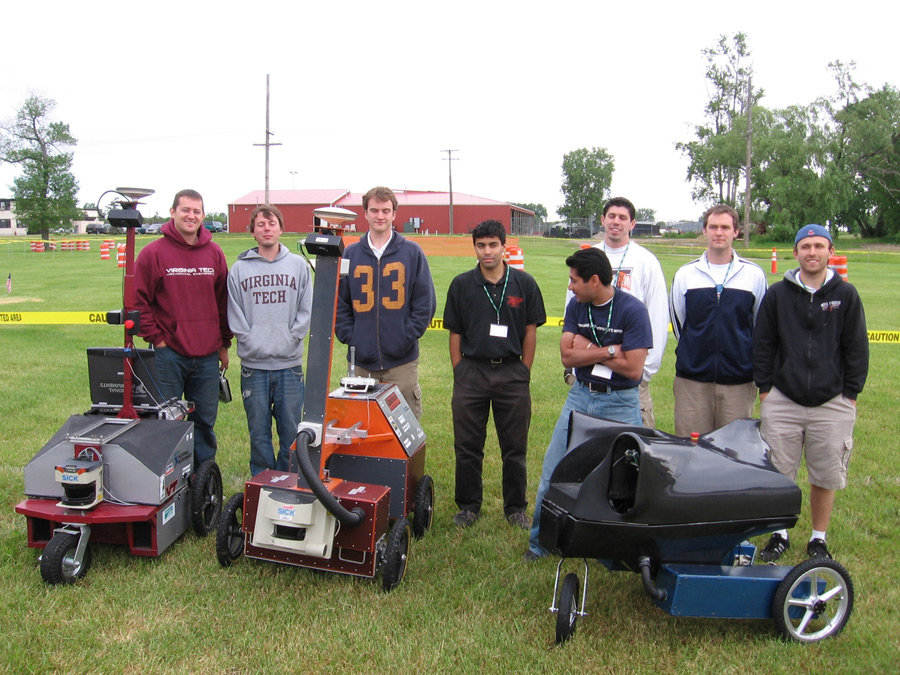Engineering students win autonomous vehicle competition for third year

For the third year in a row, the Virginia Tech College of Engineering’s Autonomous Vehicle Team swept the international Intelligent Ground Vehicle Competition (IGVC), winning best and second-best overall and placing first in the three top event categories. The team of mechanical engineering (ME) students also was awarded $15,000 in prize money.
The Virginia Tech team entered three of the 40 autonomous vehicles that competed in this year’s IGVC, which took place in June at the Selfridge Air National Guard Base in Harrison Township, Mich. Thirty-three universities in the U.S. and other countries were represented at the event.
The Virginia Tech students were guided by ME faculty advisers Charles Reinholtz, Alumni Distinguished Professor, and professor Alfred Wicks. Much of the design and construction of the vehicles was directed by graduate students Andrew Bacha of Reston, Va.; Ruel Faruque of Charlottesville, Va.; and Brett Gombar of Montclair, Va.
Three team members graduated from Virginia Tech in May with bachelor’s degrees in ME: Ben Amar of Pembroke, N.H.; Randy Depoo of Herndon, Va.; and Ryan Tenga of Fairfax, Va. Graduate student Jon Weekly of Cincinnati, Ohio, and senior Peter King of Alexandria, Va., also participated in the competition.
During the IGVC, autonomous vehicles use on-board computer and navigational technologies to navigate obstacle courses and point-to-point destination courses without human intervention. The entries also are judged on design innovations.
The Virginia Tech team equipped their vehicles — “Chimera,” “Gemini” and “Johnny-5” — with computers and navigational sensors, including digital cameras, digital compasses, GPS and scanning laser range finders. The vehicles differ in body construction, power sources, and operational variations that the team implemented in the on-board computer software.
Gemini placed best overall in the 2006 IGVC — repeating its first-place performance from the 2005 competition — and also won the Autonomous Challenge. Johnny-5, which best placed overall in 2004, came in second place overall for 2006 and won the Navigation Challenge. Chimera, a new vehicle built during the past academic year, placed first in the Design Competition.
The Virginia Tech team also won prizes for implementing a new software standard for unmanned systems and for implementing the ability to point to a target at the end of a navigation run.
The IGVC is supported by a number of sponsors, including the Association for Unmanned Vehicle Systems International, U.S. Department of Defense, Society of Automotive Engineers, and General Motors.
The College of Engineering at Virginia Tech is internationally recognized for its excellence in 14 engineering disciplines and computer science. The college's 5,500 undergraduates benefit from an innovative curriculum that provides a "hands-on, minds-on" approach to engineering education, complementing classroom instruction with two unique design-and-build facilities and a strong Cooperative Education Program. With more than 50 research centers and numerous laboratories, the college offers its 1,800 graduate students opportunities in advanced fields of study such as biomedical engineering, state-of-the-art microelectronics, and nanotechnology. Virginia Tech, the most comprehensive university in Virginia, is dedicated to quality, innovation, and results to the commonwealth, the nation, and the world.



.jpg.transform/m-medium/image.jpg)
